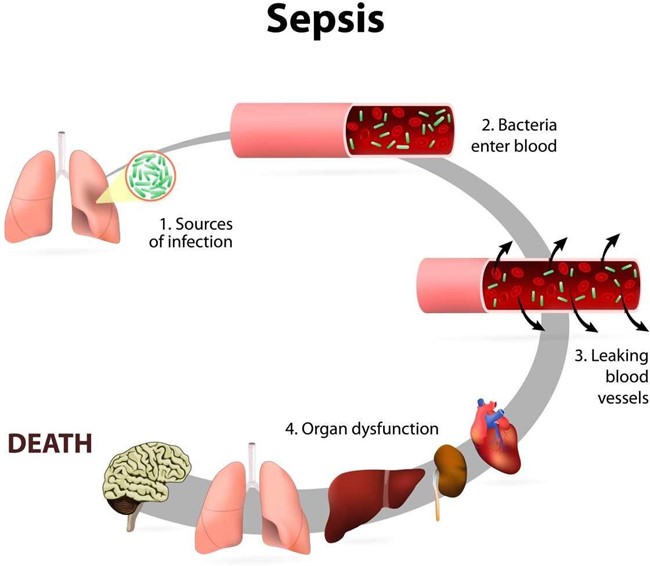Which of the following would the nurse expect to assess in a newborn who develops sepsis?
Increased urinary output
Hypothermia
Wakefulness
Interest in feeding
The Correct Answer is B
Choice A) Increased urinary output: This is not a sign of sepsis in newborns. In fact, sepsis can cause reduced urinary output due to poor blood flow to the kidneys and dehydration.
Choice B) Hypothermia: This is a sign of sepsis in newborns. Sepsis can cause changes in temperature, often fever, but sometimes low temperature. Hypothermia can indicate a severe infection that affects the body's ability to regulate its temperature.
Choice C) Wakefulness: This is not a sign of sepsis in newborns. Sepsis can cause reduced activity and lethargy due to inflammation and organ dysfunction.
Choice D) Interest in feeding: This is not a sign of sepsis in newborns. Sepsis can cause reduced sucking and difficulty feeding due to poor appetite, nausea, vomiting, and abdominal distension.

Nursing Test Bank
Naxlex Comprehensive Predictor Exams
Related Questions
Correct Answer is D
Explanation
Choice A) Weight gain of 0.5 kg during the past 2 weeks: This is a normal weight gain for a pregnant woman and does not indicate preeclampsia.
Choice B) Pitting pedal edema at the end of the day: This is a common symptom of pregnancy and does not necessarily indicate preeclampsia. It can be relieved by elevating the legs and wearing compression stockings.
Choice C) Blood pressure increase to 138/86 mm Hg: This is a mild elevation of blood pressure and does not meet the criteria for preeclampsia, which is defined as a systolic blood pressure of 140 mm Hg or higher or a diastolic blood pressure of 90 mm Hg or higher on two occasions at least four hours apart.
Choice D) Dipstick value of 3+ for protein in her urine: This is a sign of significant proteinuria, which is one of the main features of preeclampsia. Proteinuria is defined as a urinary protein excretion of 300 mg or more in 24 hours or a dipstick reading of 1+ or higher. A dipstick value of 3+ indicates severe proteinuria and requires immediate attention and treatment. This woman has the highest risk of developing complications from preeclampsia, such as eclampsia, HELLP syndrome, placental abruption, or fetal growth restriction . Therefore, she should be seen by the nurse first.

Correct Answer is C
Explanation
Choice A: This is incorrect because preeclampsia is a condition characterized by hypertension, proteinuria, and edema that occurs after 20 weeks of gestation. It is not related to abruptio placentae, which is the premature separation of the placenta from the uterine wall. Preeclampsia does not cause petechiae or bleeding around the IV site, but it may cause headache, blurred vision, epigastric pain, or seizures.
Choice B: This is incorrect because anaphylactoid syndrome of pregnancy, also known as amniotic fluid embolism, is a rare and life-threatening complication that occurs when amniotic fluid enters the maternal circulation and triggers an allergic reaction. It is not related to abruptio placentae, but it may occur during labor, delivery, or shortly after birth. Anaphylactoid syndrome of pregnancy does not cause petechiae or bleeding around the IV site, but it may cause respiratory distress, hypotension, cardiac arrest, or disseminated intravascular coagulation.
Choice C: This is the correct answer because disseminated intravascular coagulation (DIC) is a condition in which the blood clotting system is activated abnormally, leading to excessive clot formation and consumption of clotting factors and platelets. This results in bleeding from various sites, such as the IV site, gums, nose, or vagina. DIC is a common complication of abruptio placentae, as the release of thromboplastin from the placenta triggers the clotting cascade. DIC can also cause organ failure, shock, or death if not treated promptly.
Choice D: This is incorrect because puerperal infection, also known as postpartum infection, is a bacterial infection that affects the uterus, vagina, bladder, or wound site after childbirth. It is not related to abruptio placentae, but it may occur due to prolonged labor, cesarean delivery, retained placenta, or poor hygiene. Puerperal infection does not cause petechiae or bleeding around the IV site, but it may cause fever, malaise, foul-smelling lochia, or pelvic pain.

Whether you are a student looking to ace your exams or a practicing nurse seeking to enhance your expertise , our nursing education contents will empower you with the confidence and competence to make a difference in the lives of patients and become a respected leader in the healthcare field.
Visit Naxlex, invest in your future and unlock endless possibilities with our unparalleled nursing education contents today
Report Wrong Answer on the Current Question
Do you disagree with the answer? If yes, what is your expected answer? Explain.
Kindly be descriptive with the issue you are facing.
